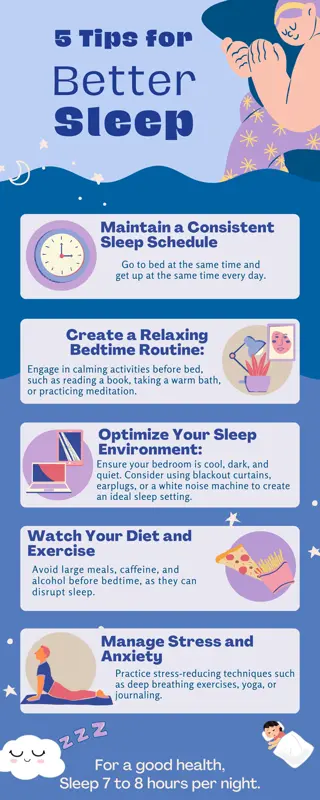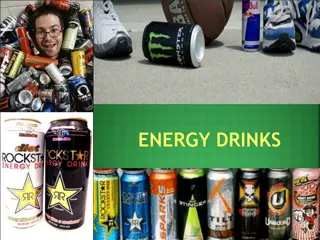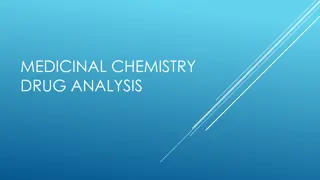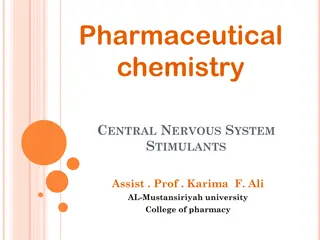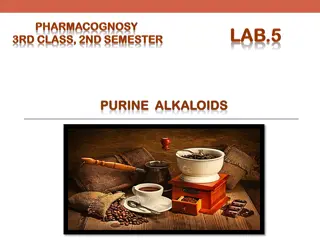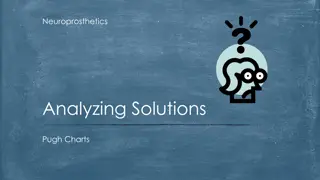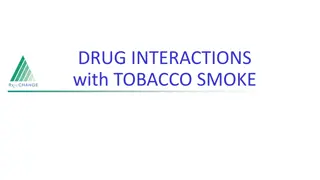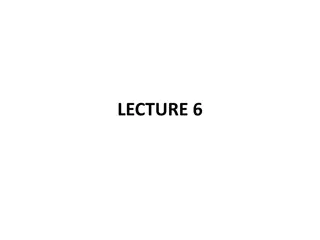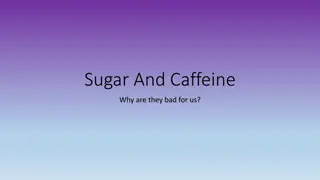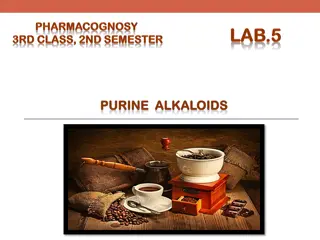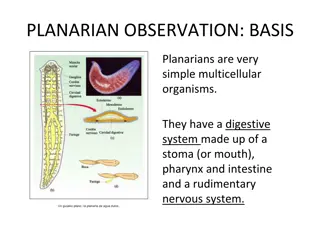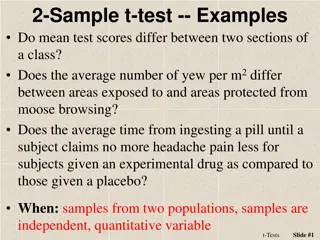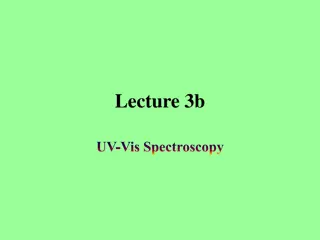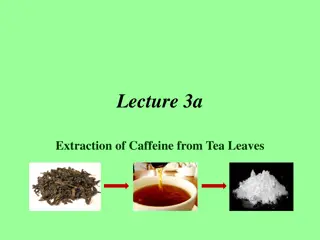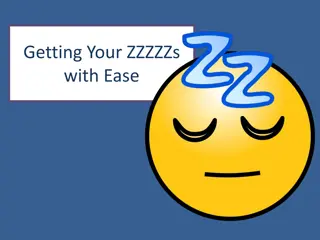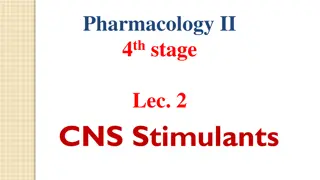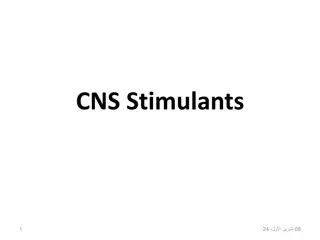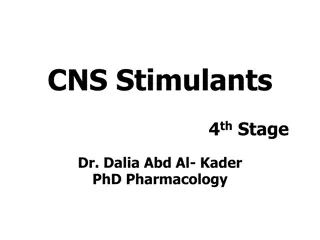5 tips of better sleep
Better sleep can be achieved by maintaining a consistent sleep schedule, going to bed and waking up at the same time daily. Create a calming bedtime routine free from screens and bright lights. Optimize your sleep environment with a cool, dark, and quiet room, using blackout curtains or white noise
0 views • 1 slides
Stress Management Tips for a Balanced Life
Embrace the things you can't control, strive for your best without seeking perfection, maintain a positive outlook, identify stress triggers, limit alcohol and caffeine intake, prioritize balanced meals, ensure sufficient sleep, engage in regular physical activity, practice deep breathing, give back
0 views • 4 slides
Isolation and Analysis of Alkaloids: Atropine, Quinine, Reserpine, Caffeine
Alkaloids are extracted and isolated based on their basic character and solubility patterns using processes like Stas Otto. The general method includes treating plant material with solvents, extracting with ethanol, and separating bases using various techniques. Atropine, obtained from plants like A
2 views • 28 slides
Understanding Energy Drinks: Ingredients, Effects, and Risks
Energy drinks are popular beverages containing caffeine and other ingredients that claim to boost energy. This article explores common ingredients, the effects of caffeine, risks associated with excessive consumption, and potential side effects of additives like B vitamins, ginseng, and ginkgo bilob
0 views • 13 slides
Exploring Medicinal Chemistry and Drug Analysis
Medicinal chemistry involves the discovery and development of therapeutic chemicals for medicine, focusing on the interaction of compounds with biological systems. It explores the benefits and drawbacks of drugs, emphasizing the importance of safety and efficacy. Examples such as morphine, barbitura
0 views • 16 slides
Overview of Central Nervous System Stimulants in Pharmaceutical Chemistry
Central Nervous System Stimulants encompass a diverse group of agents with various effects on the CNS, including analeptics, methylxanthines, central sympathomimetic drugs, and antidepressants. Analeptics are potent CNS stimulants with limited use, while methylxanthines like caffeine have widespread
4 views • 41 slides
Understanding Purine Alkaloids and Their Pharmacological Activities
Purine alkaloids are a class of compounds with a unique structure, different from typical alkaloids. They include caffeine, theophylline, and theobromine, each with distinct effects on the body. These compounds are found in plants like coffee, tea, and cola, and have various pharmacological activiti
4 views • 15 slides
Making Tough Decisions with Pugh Charts in Neuroprosthetics
When faced with tough decisions in neuroprosthetics, utilizing Pugh Charts can streamline the process. By allowing engineers to rank design plans based on criteria such as cost, taste, and strength of caffeine, resources can be efficiently allocated to the most viable solutions. Pre-reading, practic
0 views • 11 slides
Interactions of Tobacco Smoke with Medications: Effects and Recommendations
Drug interactions with tobacco smoke can impact the pharmacokinetics and pharmacodynamics of various medications. Tobacco smoke constituents can induce enzymes that affect the metabolism of drugs, leading to altered therapeutic responses. For example, CYP1A2 enzyme induction by tobacco smoke can dec
0 views • 6 slides
Protective Health Benefits of Tea: A Comprehensive Overview
Tea, especially green tea, offers a range of protective health benefits due to its rich content of flavonoids, catechins, and polyphenols. These compounds act as powerful antioxidants, reducing the risk of heart disease, cancer, diabetes, and other ailments. Tea consumption is linked to improved kid
0 views • 27 slides
The Dangers of Excessive Sugar and Caffeine Consumption
Excessive consumption of sugar and caffeine can have negative impacts on our health. Sugar can lead to weight gain, heart disease, diabetes, tooth decay, and skin issues. Meanwhile, too much caffeine can cause jitters, upset stomach, difficulty sleeping, and dependence. This article also provides ti
1 views • 6 slides
Understanding Purine Alkaloids: Properties, Isolation, and Pharmacological Activities
Purine alkaloids are a group of compounds with unique characteristics, such as a heterocyclic nucleus and specific methylated forms like caffeine, theophylline, and theobromine. While they have diverse pharmacological activities like CNS stimulation and diuretic effects, their identification often i
0 views • 16 slides
Understanding the Impact of Diet on Your Health
Explore how diet influences your weight, learn about essential nutrients like fats, fiber, water, and vitamins, understand the effects of a high-fat diet, and discover why moderation is key with salt, sugar, and caffeine intake.
0 views • 35 slides
Planarian Observation: Nervous System Activity Study
Planarian Observation involves studying the effects of different substances on a planarian's nervous system. Through remote laboratory experiments, observations are made on the movement of planarians in various solutions compared to a control solution. Results are analyzed to determine the effects o
0 views • 7 slides
Understanding 2-Sample t-Test Examples
The 2-sample t-test is used to determine if mean scores differ between two groups in various scenarios, such as comparing test scores in different sections, yew density in moose browsing areas, or headache pain relief with different treatments. Key steps include formulating hypotheses, calculating t
0 views • 13 slides
Understanding UV-Vis Spectroscopy and Electronic Transitions
UV-Vis spectroscopy involves the absorption of electromagnetic radiation by molecules, causing electronic transitions. Different chromophores and conjugated systems determine the wavelength absorbed, with the Beer-Lambert Law essential for quantification. Specific compounds like caffeine showcase un
0 views • 12 slides
Understanding Caffeine Extraction from Tea Leaves
Caffeine, a widely consumed alkaloid, is extracted from tea leaves using organic chemistry techniques. This process involves liquid-liquid extraction to isolate the caffeine from the mixture of substances. The efficiency of extraction relies on the solubility of the target compound in a chosen solve
0 views • 17 slides
Essential Tips for Improving Your Sleep Quality
Understand the importance of sleep and how it affects your body and mind. Learn how much sleep you need at different ages and the consequences of sleep deprivation. Discover signs that indicate you need more rest and practical strategies for achieving better sleep, including maintaining a sleep sche
0 views • 6 slides
Understanding CNS Stimulants and Their Mechanisms of Action
CNS stimulants are a type of drug that increase certain chemicals in the brain, enhancing alertness, attention, energy, and physical activity. This article explores psychomotor stimulants like caffeine, nicotine, cocaine, amphetamine, and methylphenidate, discussing their mechanisms of action and ef
0 views • 34 slides
Overview of CNS Stimulants and Their Effects on the Body
CNS stimulants are drugs that primarily act on the central nervous system, with two main groups being psychomotor stimulants and hallucinogens. Common examples include caffeine, theophylline, and nicotine. These stimulants can have various effects on the body, such as increasing alertness, heart rat
0 views • 14 slides
Mechanism and Clinical Uses of CNS Stimulants
CNS stimulants, including psychomotor stimulants and hallucinogens, have diverse clinical uses but are also potential drugs of abuse. Psychomotor stimulants such as caffeine affect the CNS by translocating extracellular calcium, increasing cyclic adenosine monophosphate, and blocking adenosine recep
0 views • 29 slides
Two-Way ANOVA Analysis of Complex Motor Tasks in a Sleep Deprivation Study
The study investigates the impact of sleep deprivation and stimulant types on motor task performance in a driving simulation game. Factors such as sleep deprivation methods (control, jet lag, interrupted, total deprivation) and stimulant types (placebo, caffeine, reward) are analyzed through a two-w
1 views • 10 slides
